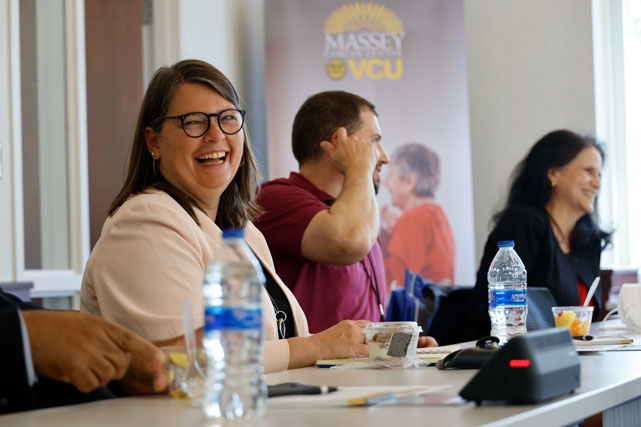Latest News
Massey hosts president of American Cancer Society Cancer Action Network
Aug 19, 2022

Lisa Lacasse, president of the American Cancer Society Cancer Action Network (ACS CAN), met with leaders of VCU Massey Cancer Center on Friday, August 12, 2022 at the Goodwin Research Laboratory.
Lacasse took a tour of the lab of Robert A. Winn, M.D., director and Lipman chair in oncology at Massey, and discussed issues impacting cancer on both the federal and state level.
Massey representatives from the areas of research, community engagement, clinical care and administration joined the conversation, along with those from the VCU Douglas Wilder School of Government and Public Affairs, VCU and VCU Health Government and External Relations and the American Cancer Society, Southeast Region.
“At the end of the day, what everyone can do as part of the ecosystem is tell their stories, their focus,” Lacasse told the group about how to get involved with ACS CAN, which is the American Cancer Society’s nonprofit, nonpartisan advocacy affiliate. “We have a lead ambassador for every single state, and then they mobilize volunteers to send messages to officials.”
Lacasse shared that ACS CAN has three main priorities:
- Access to care, including affordability and issues like Medicaid expansion
- Accelerated cures that involve federal appropropriations for cancer research
- Prevention as part of programs for tobacco cessation and cancer screenings for under-insured individuals
As the conversation segued into one about patient navigation, Lacasse learned more about Massey’s approach.
“While we have health system navigators, we also have an understanding that we need to have community navigators,” Winn explained. “They are the link in the community, and once patients get to the hospital, how do they navigate the system? There is that whole question of how do we even get them to the health system? Massey’s secret sauce is being aware that our health system navigators cannot go to Church Hill or out in Danville, where the people we serve actually live.”
Winn added, “We have some people who don’t even make it to our door. They have to overcome barriers to their own diagnosis. We want to be a place where people don’t just come when they have cancer, a service of here’s who you should talk to. The hand-off of this community navigator is addressing these other issues.”
Vanessa Sheppard, Ph.D., associate director for community outreach engagement (COE) and health disparities at Massey, spoke about Massey’s expansive catchment area and how critical community navigators are to the ability to serve all people.
“We are a Medicaid expansion state, but that doesn’t mean everyone has filled out that form,” said Sheppard. “We need that community navigator who knows what resources are there and fills out the form for community members and helps with appointments and addressing social determinants of health. Transportation is a huge issue in this large geographical area. Community navigators have needed resources at their fingertips. They can work with the health system and other members of the navigation team and bring those resources to each individual who needs them.”
Michael Gesme, MPA, program manager for COE at Massey, discussed how his team utilizes partnerships throughout the catchment area to further navigation efforts. In addition to dedicated staff members who work with Federally Qualified Health Centers (FQHC), community coordinators from Massey attend educational events and provide outreach; partnerships with faith leaders through Massey’s Facts & Faith Fridays program allow them to share accurate health information with their congregants.
Andrew Poklepovic, M.D., medical director of the Clinical Trials Office at Massey, said patient navigation is a crucial part of Massey’s efforts to boost enrollment in clinical trials. Giving patients a direct connection to resources then benefits research too.
“We aren’t just navigating people to the trials. We are navigating a large number of minority patients to the trials,” Winn explained of Massey’s ongoing efforts to diversify the clinical trial patient population. “Without these pieces, I don't think we would have as much success.”
Lacasse, who took the lead of the Washington, DC-based team in 2019, thanked Massey for its commitment and outreach throughout the catchment area.
Katherine Tossas, Ph.D., M.S., director of catchment area data access and alignment, Harrison Endowed Scholar in Cancer Research and Cancer Prevention and Control research member at VCU Massey Cancer Center, spoke about cancer profiling, cancer clusters and statistics that she has provided lawmakers.
“We have an incredible partnership here,” Lacasse said, gesturing to the group that joined the discussion. “You can help by knowing who your elected officials are. They need expert advice. A lot of these issues can be complicated, and you can aggregate the complexity.”
Written by: Amy Lacey
Related News
Research & Innovation
Genetic code deploys cancer mafia, new targeted drug gives them an offer they can’t refuseSep 3, 2025
Research & Innovation
Researchers awarded $7.3 million grant to launch groundbreaking breast cancer clinical trialAug 28, 2025

Get access to new, innovative care
Treatments in clinical trials may be more effective or have fewer side effects than the treatments that are currently available. With more than 200 studies for multiple types of cancers and cancer prevention, Massey supports a wide array of clinical trials.

Find a provider
Massey supports hundreds of top cancer specialists serving the needs of our patients. Massey’s medical team provides a wealth of expertise in cancer diagnosis, treatment, prevention and symptom management.
